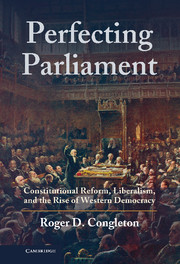1 - On the Origins of Western Democracy
Published online by Cambridge University Press: 05 June 2012
Summary
Introduction: On the Evolutionary Character of Western Democracy
Most of us in the West take our contemporary form of governance and political theories for granted. The practices of selecting representatives through elections based on broad suffrage, the concentration of legislative authority in elected parliaments (legislatures), and the holding of annual meetings of parliaments have become the normal routines of political life in the West. That governance should be grounded in the consent of the governed, that various civil liberties should be essentially absolute, and that all citizens should be equal before the law are nearly universally supported and largely unquestioned. That representative governments should adopt laws in a manner consistent with constitutional procedures and constraints is so broadly accepted that it is hard for most of us to imagine any other legitimate form of government.
Most of us also acknowledge that much of the general architecture and many of the principles of contemporary governance are far older than our governments. The idea of the rule of law, if not equality before the law, can be traced back at least as far as the code of Hammurabi, which was chiseled into stone tablets in about 1775 BCE. The foundation of many of our political theories about representative government can be found in classical Greek philosophy, as in Aristotle’s Politics written in about 330 BCE. Parliaments themselves date back at least to the late Middle Ages, as do elections for seats in parliament. Yet we also understand that constitutional governance based on equality before the law and broad suffrage is a relatively new phenomenon.
- Type
- Chapter
- Information
- Perfecting ParliamentConstitutional Reform, Liberalism, and the Rise of Western Democracy, pp. 1 - 24Publisher: Cambridge University PressPrint publication year: 2010



